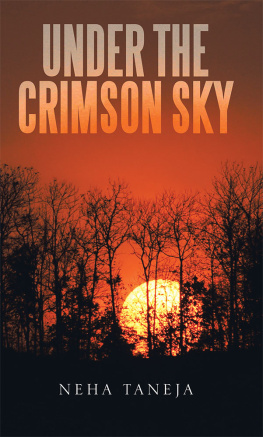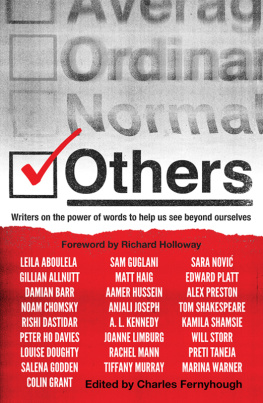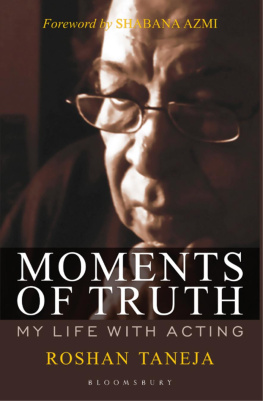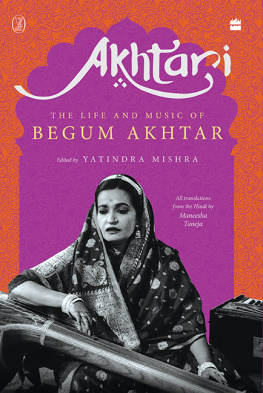Taneja - Jinnealogy
Here you can read online Taneja - Jinnealogy full text of the book (entire story) in english for free. Download pdf and epub, get meaning, cover and reviews about this ebook. year: 2018, publisher: Stanford University Press, genre: Religion. Description of the work, (preface) as well as reviews are available. Best literature library LitArk.com created for fans of good reading and offers a wide selection of genres:
Romance novel
Science fiction
Adventure
Detective
Science
History
Home and family
Prose
Art
Politics
Computer
Non-fiction
Religion
Business
Children
Humor
Choose a favorite category and find really read worthwhile books. Enjoy immersion in the world of imagination, feel the emotions of the characters or learn something new for yourself, make an fascinating discovery.

- Book:Jinnealogy
- Author:
- Publisher:Stanford University Press
- Genre:
- Year:2018
- Rating:5 / 5
- Favourites:Add to favourites
- Your mark:
- 100
- 1
- 2
- 3
- 4
- 5
Jinnealogy: summary, description and annotation
We offer to read an annotation, description, summary or preface (depends on what the author of the book "Jinnealogy" wrote himself). If you haven't found the necessary information about the book — write in the comments, we will try to find it.
Jinnealogy — read online for free the complete book (whole text) full work
Below is the text of the book, divided by pages. System saving the place of the last page read, allows you to conveniently read the book "Jinnealogy" online for free, without having to search again every time where you left off. Put a bookmark, and you can go to the page where you finished reading at any time.
Font size:
Interval:
Bookmark:
SOUTH ASIA IN MOTION
EDITOR
Thomas Blom Hansen
EDITORIAL BOARD
Sanjib Baruah
Anne Blackburn
Satish Deshpande
Faisal Devji
Christophe Jaffrelot
Naveeda Khan
Stacey Leigh Pigg
Mrinalini Sinha
Ravi Vasudevan
JINNEALOGY
Time, Islam, and Ecological Thought in the Medieval Ruins of Delhi
ANAND VIVEK TANEJA
STANFORD UNIVERSITY PRESS
STANFORD, CALIFORNIA
Stanford University Press
Stanford, California
2018 by Anand Vivek Taneja. All rights reserved.

Awarded the Joseph W. Elder Prize in the Indian Social Sciences by the American Institute of Indian Studies and published with the Institutes generous support.
AIIS Publication Committee:
Susan S. Wadley, Brian A. Hatcher, Co-chairs
Joyce B. Flueckiger, Pika Ghosh, Mytheli Sreenivas, Ramnarayan S. Rawat
No part of this book may be reproduced or transmitted in any form or by any means, electronic or mechanical, including photocopying and recording, or in any information storage or retrieval system without the prior written permission of Stanford University Press.
Printed in the United States of America on acid-free, archival-quality paper
Library of Congress Cataloging-in-Publication Data
Names: Taneja, Anand Vivek, 1980 author.
Title: Jinnealogy : time, Islam, and ecological thought in the medieval ruins of Delhi / Anand Vivek Taneja.
Description: Stanford, California : Stanford University Press, 2017. | Series: South Asia in motion | Includes bibliographical references and index.
Identifiers: LCCN 2017012270 (print) | LCCN 2017014062 (ebook) | ISBN 9781503603950 (e-book) | ISBN 9781503601796 (cloth : alk. paper) | ISBN 9781503603936 (pbk. :alk. paper)
Subjects: LCSH: JinnIndiaDelhi. | IslamIndiaDelhi. | Muslim saintsIndiaDelhi. | Islamic antiquitiesIndiaDelhi. | IslamRelationsHinduism. | Delhi (India)Religious life and customs.
Classification: LCC BP63.I42 (ebook) | LCC BP63.I42 T363 2017 (print) | DDC 297.3/9095456dc23
LC record available at https://lccn.loc.gov/2017012270
Typeset by Bruce Lundquist in 10.75/15 Adobe Caslon
CONTENTS
LIST OF ILLUSTRATIONS

MAP 1. Firoz Shah Kotla and its surroundings.

MAP 2. Some of the places discussed in this book.
ACKNOWLEDGMENTS
Tera tujh ko saunp de kya lagat hai mor? If I return to you what is yours, then what is left of me? In the writing of this book, I have accrued too many debts to ever account for in full measure.
Columbia University was a generous intellectual home. I continue to learn much from every interaction with Partha Chatterjee, and his intellectual generosity and openness remain a model for me, as does his engagement with subaltern politics. Brinkley Messick, with his kind and rigorous mentorship, made sure that I became an anthropologist of Islam as well as an anthropologist of South Asia. Michael Taussigs experiments with ficto-criticism and his deep engagement with Walter Benjamin underlie pretty much every page of this book. Manan Ahmed Asifs example as a public intellectual and his engagement with futures past, as well as his practical life-advice, have been crucial to my work and thought since we first became friends through the blogosphere in 2005. Carla Bellamys deep engagement with dargah culture and her support and encouragement throughout my fieldwork have had an enormous impact on my work and thought. I also learned enormously from Nadia Abu El Haj, Severin Fowles, Elizabeth Povinelli, Zoe Crossland, Jyoti Hosagrahar, Nathaniel Roberts, and Shahid Amin. Conversations with Frances Pritchett, and her weekly Ghalib gatherings, made Columbia an even more hospitable space once I returned from fieldwork.
The research and writing of this book would not have been possible without the rahnumai of many friends. Bhrigupati Singh was with me when I first noticed the dargah of Nanhe Miyan at Mandi House Circle. His work continues to inspire my own, and our disagreements merely prove how productive and provocative his thinking is. Nauman Naqvi, the original gharib nawaz, opened up worlds of thought and emotion with every conversation we shared outside Butler Library, and in some sense, this book continues our conversations. Pasha Mohamed Khan shared his extensive knowledge of Islamic lore and literature and guided me to medieval sira literature, thus providing a genealogy to jinnealogy. Raghu Karnads curiosity and enthusiasm propelled much of my fieldwork. Kaushik Bhaumiks thoughts about cinema and religion have been hugely productive for my own. Siobhan Lambert-Hurleys groundbreaking work with Muslim womens autobiographies opened my eyes to what I might have missed otherwise. Abhishek Kaickers historical work on early modern Delhi has provided important insights into my ethnographic engagement with the contemporary city. Joel Lees warmth and hospitality, and his engagement with the question of untouchable religion, have been a model of gharib nawazi. Amaar Abbas introduced me to the mysteries of Mehrauli. Sarover Zaidi guided me to crucial contacts in Begampur. Naib-ul-Haq Qasimis generosity opened up entire worlds for me in Old Delhi and in Uttar Pradesh. Conversations with Narayani Gupta, Kai Friese, Farid Nizami, Nayanjot Lahiri, Swapna Liddle, Rana Dasgupta, Ravi Sundaram, Sohail Hashmi, Shahid Amin, and Sunil Kumar were crucial to my understanding of the deep historical transformations and contemporary discontents of Delhi. Jayant Tripathi and Ratish Nanda shared their valuable insider information into the politics of heritage in Delhi and opened many doors that would otherwise have remained closed.
The research for this book was made possible through the generosity of Columbia University, the Wenner-Gren Foundation for Anthropological Research, and Vanderbilt University. The writing of several drafts of this book has been made possible through the generosity of Severin Fowles and Ellen Morris, Pooja Dodd, and the Robert Penn Warren Center for the Humanities at Vanderbilt University, each of whom provided beautiful spaces to think and write in. In the process of writing I benefited immensely from the initial reading of Maheen Zaman, Owen Cornwall, and Taymiya Zaman, whose enthusiasm propelled me through several drafts. Avtar Singhs push to make my research accessible resulted not just in an article but in a form of writing. Sean Dowdys enthusiasm about jinnealogy, Giovanni da Cols insights, and the anonymous reviewers from HAU have contributed a great deal to my shaping of . The thinking about Islam in this book has been greatly shaped by the Local Islams workshops at Vanderbilt and the yearlong Sawyer Seminar Vernacular Islams Beyond the Arab World. The workshops and the seminar facilitated wonderful and remarkably productive conversations, which have been greatly productive for my thinking and writing. In particular I would like to thank my colleagues Tony Stewart, Richard McGregor, and Samira Sheikh, whose intellectual engagement and generosity have been models of collegiality. I would like to thank Mathangi Krishnamurthy, Margrit Pernau, Anna Gade, Alireza Doostdar, Yunus Dogan Telliel, Roanne Kantor, Audrey Truschke, Kalyani Menon, Irfan Ahmed, and Aarti Sethi for giving me the opportunity to present my work at some remarkable conference panels and to initiate some remarkable conversations. I would also like to thank Ravi Sundaram, Arthur Dudney, Mahesh Rangarajan, Gautam Bhan, Pankaj Jha, Akbar Hyder, Azfar Moin, Kathy Ewing, Sean Pue, Karen Zitzewitz, Sarra Tlili, Emilie Townes, Ali Asani, K. Sivaramkrishnan, Erik Harms, Audrey Truschke, Kabir Tambar, Ann Grodzins-Gold, Daniel Gold, Hayden Kantor, Ifthikar Dadi, Teena Purohit, Farina Mir, Alaina Lemon, Alireza Doostdar, Muzaffar Alam, CM Naim, Tyler Williams, Liz Chatterjee, Naisargi Dave, Sandra Bamford, Girish Daswani, Katie Kilroy-Marac, Brian Larkin, Durba Mitra, Gigi Dopico, and Barry Flood. Their hospitality and generous engagement with my work gave me the opportunity to present my work to diverse audiences, and the conversations that followed have influenced my thoughts in perceptible and imperceptible ways. Farina Mirs graduate seminar read the manuscript a few weeks before submission, and their insights have been enormously helpful in shaping its final form. I would like to thank Salman Hussain and Janaki Phillips in particular for their careful engagement.
Next pageFont size:
Interval:
Bookmark:
Similar books «Jinnealogy»
Look at similar books to Jinnealogy. We have selected literature similar in name and meaning in the hope of providing readers with more options to find new, interesting, not yet read works.
Discussion, reviews of the book Jinnealogy and just readers' own opinions. Leave your comments, write what you think about the work, its meaning or the main characters. Specify what exactly you liked and what you didn't like, and why you think so.






